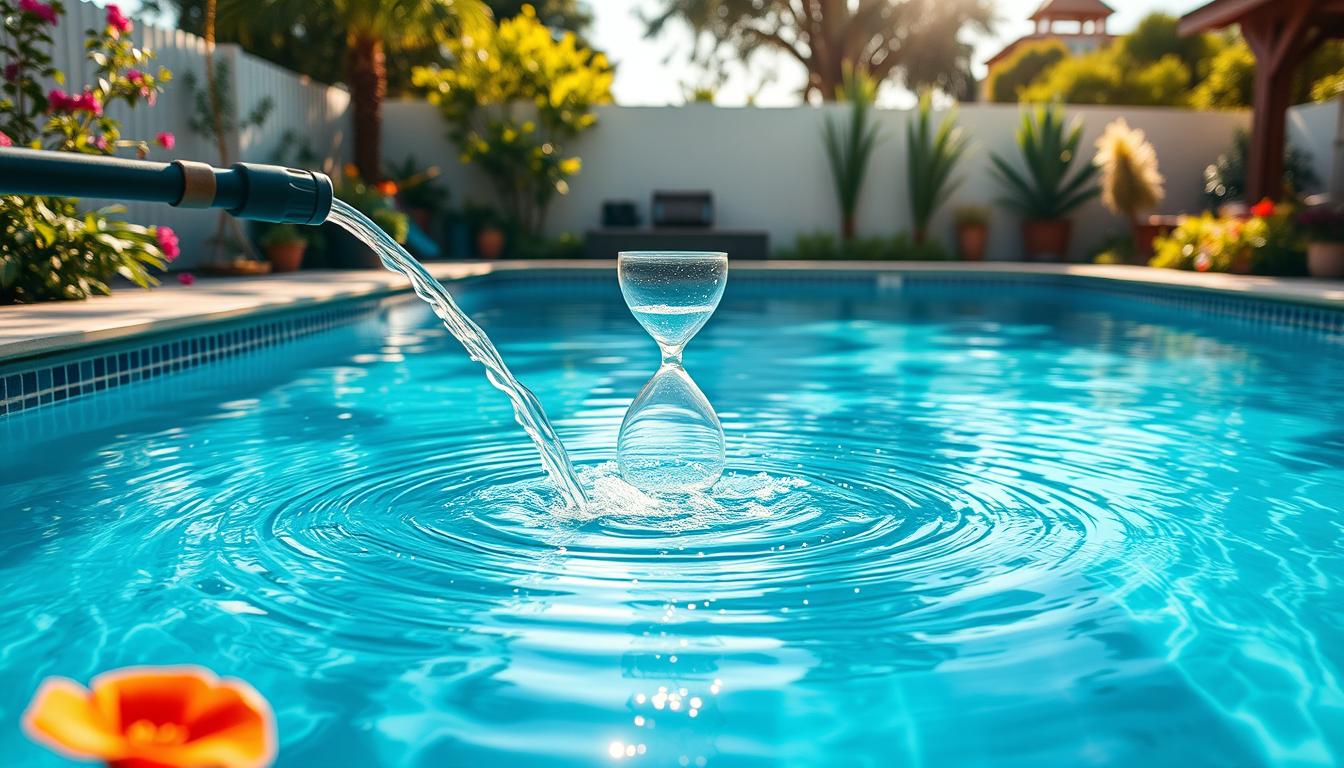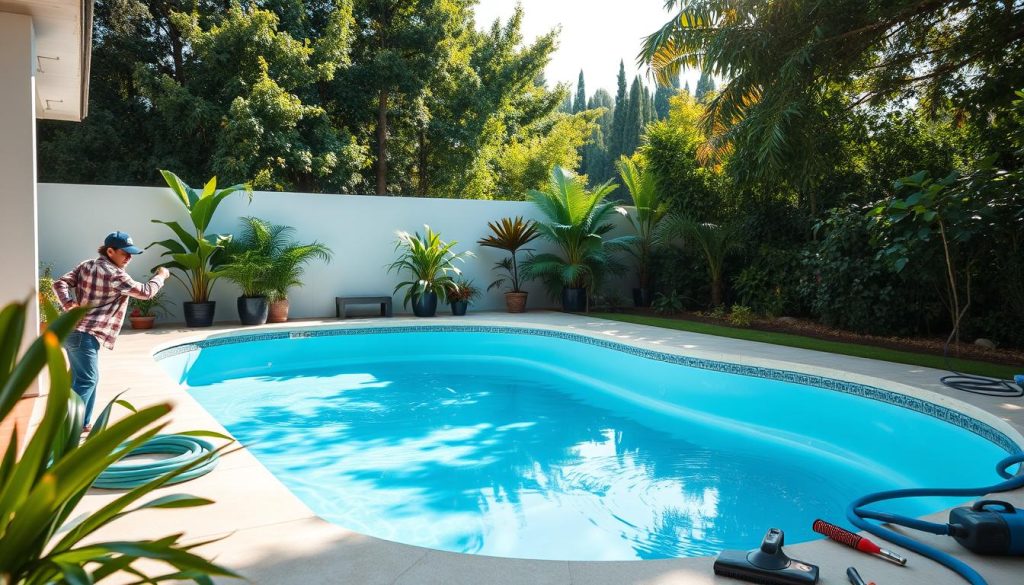
Summer heat calls for a refreshing backyard pool. Opening your pool involves filling it with water. Hiring a water service can cost $600 to $2,000 for a 20,000-gallon pool. A garden hose offers a cheaper option.
Using a garden hose to fill your residential swimming pool can save money. It costs $80 to $200 for a 20,000-gallon pool. Municipal water runs $4 to $10 per 1,000 gallons. Well water is free, but pump electricity costs apply.
Many cities waive sewer fees for pool filling. This is because the water doesn’t go through the sewer system. It’s a bonus when using a hose to fill your pool.
Before starting, consider factors like water supply pressure and garden hose water flow rate. Understanding these helps ensure success. With planning, you can fill your pool and save money.
We’ll explore pool filling calculations next. You’ll also get step-by-step guidance for this process. This information will help you fill your pool with confidence.
Understanding Pool Water Capacity and Fill Time
Knowing your pool’s volume is crucial for filling it efficiently. Your pool’s water capacity and fill time depend on several factors. By understanding these, you can plan your pool-filling process more effectively.
Calculating Your Pool’s Volume
Use a pool volume calculator or measure your pool’s dimensions. For rectangular pools, multiply length by width by average depth. Then, multiply by 7.5 to convert cubic feet to gallons.
For example, a rectangular pool measuring 30 feet long, 15 feet wide, with an average depth of 5 feet would have a volume of 16,875 gallons (30 x 15 x 5 x 7.5).
For irregular-shaped pools, divide them into smaller, regular sections. Calculate each section’s volume separately. Add all sections together to get the total pool volume.
Factors Affecting Fill Time
Several factors influence your pool’s fill time. These include:
- Water flow rate
- Water pressure
- Hose diameter
A typical garden hose delivers 9 to 17 gallons per minute (GPM). Longer hoses or lower water pressure may reduce this rate. To estimate fill time, divide your pool’s volume by the water flow rate.
| Hose Size | Water Flow Rate (GPM) | Time to Fill 20,000 Gallons |
|---|---|---|
| 1/2 inch | 9 | 37 hours |
| 5/8 inch | 12 | 28 hours |
| 3/4 inch | 17 | 20 hours |
For example, filling a 20,000-gallon pool with a hose delivering water at 12 GPM would take approximately 28 hours (20,000 ÷ 12 ÷ 60).
Preparing to Fill Your Pool
Get ready to fill your pool with ease. Proper prep saves time and keeps your pool in top shape. Follow these steps for a smooth process.

Inspecting and Cleaning the Pool
Start by checking your pool liner, skimmer, and main drain. Look for damage and fix any issues right away.
Clean the pool thoroughly. Remove debris, stains, and algae. This ensures clear, healthy water once filled.
Ensuring Proper Water Pressure and Flow Rate
Check water pressure before connecting your hose. Use a regulator if pressure tops 50 PSI to avoid damage.
Remove flow restrictors to speed up filling. If using well water, take breaks to let the well recharge.
Acquiring Necessary Equipment and Supplies
Gather all needed items before you start. Key supplies include a backflow preventer and hose filter.
You’ll also need chlorine shock to sanitize the water after filling. This kills bacteria and other contaminants.
- Backflow preventer: This device protects your home’s water supply from potential contamination by preventing pool water from flowing back into the main water line.
- Hose filter: A hose filter helps remove sediment and impurities from the water as it enters your pool, promoting cleaner and clearer water.
- Chlorine shock: Once your pool is filled, you’ll need to sanitize the water using chlorine shock to eliminate any bacteria or contaminants that may have entered during the filling process.
Check with your local water department about restrictions or permits. Some areas offer sewer fee waivers for pool filling.
| Pool Volume (gallons) | MetalFree (liters) | Dry Acid (pounds per 10 ppm reduction) | Hardness Plus (pounds per 10 ppm increase) |
|---|---|---|---|
| 10,000 | 0.5 | 1.5 | 1.25 |
| 20,000 | 1.0 | 3.0 | 2.50 |
| 30,000 | 1.5 | 4.5 | 3.75 |
| 40,000 | 2.0 | 6.0 | 5.00 |
Follow these steps to fill your 20,000 gallon pool efficiently. With the right prep, you’ll have a clean, ready-to-use pool in no time.
How Long Does It Take to Fill a 20,000 Gallon Pool with a Garden Hose?
Filling a 20,000-gallon pool with a garden hose takes time. Several factors affect how long it takes. Understanding these can help you plan better.
Average Fill Time for a 20,000 Gallon Pool
Garden hose flow rates greatly impact pool filling time. Most hoses deliver 9 to 17 gallons per minute (GPM). This affects how long it takes to fill your pool.
Here’s an estimate of fill times for a 20,000-gallon pool:
| Flow Rate (GPM) | Fill Time (Hours) |
|---|---|
| 9 | 37 |
| 12 | 28 |
| 15 | 22 |
| 17 | 20 |
Fill times can range from 20 to 37 hours. Actual times may vary due to water pressure and other factors.
Optimizing Water Flow for Faster Filling
To fill your pool faster, try these strategies:
- Use multiple hoses at once to increase water flow
- Choose a larger diameter hose for greater water flow
- Ensure good water pressure, but avoid exceeding recommended levels
- Fill during off-peak hours for better pressure and flow
Monitoring the Filling Process
Watch the water level regularly to prevent overfilling. For inground pools, fill to halfway up the skimmer opening. Above-ground pools should be filled to the manufacturer’s recommended level.
Keep a close eye on the filling process and adjust the hose position as needed to ensure even water distribution and prevent damage to the pool liner or structure.
Understanding fill time factors helps you plan better. Optimizing water flow and monitoring the process ensures efficient pool filling. This approach helps you safely fill your 20,000-gallon pool using a garden hose.
Post-Filling Maintenance and Water Treatment
After filling your pool, proper maintenance is key for safe swimming. Test the water using a reliable kit. This helps determine pH, alkalinity, and chlorine levels.
Adjust the chemical balance based on test results. Add chlorine shock to sanitize the pool. Maintain pH levels between 7.2 and 7.6 for effective chlorine and swimmer comfort.
Run the pool filter for 24 hours after treatment. This ensures thorough water circulation and debris removal.
Perform regular maintenance tasks to keep your pool clean. Skim the surface, brush walls and floor, and vacuum regularly. These steps will help maintain a sparkling pool all season.







